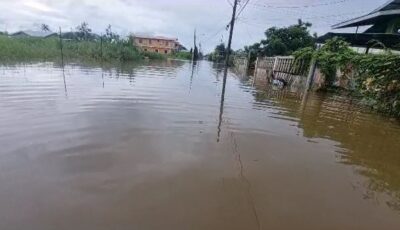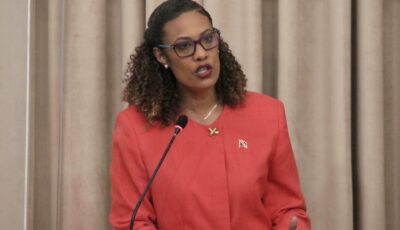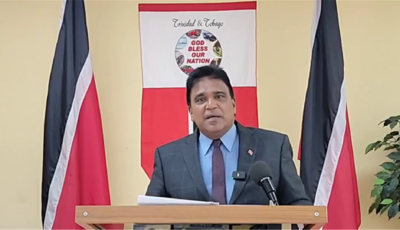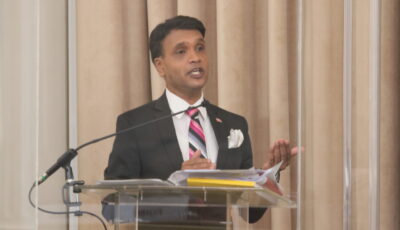HEADLINES
Commentary
Rowley strenuously objected to the construction of Penal-Debe UWI Campus
The media is reporting that the UWI Penal-Debe Campus, built during the People’s Partnership Administration continues to sit empty and has never
Posted On 30 Oct 2023
Blighted WGTL Project continues to haunt PNM
That World Gas-to-Liquids project is another of the many PNM scandals and failed projects which has cost taxpayers billions of dollars! And it is
Posted On 22 Jun 2023
Who financing Balisier House?
Ferdinand Ferreira, a founding member of the People’s National Movement (PNM), is quoted in the media as saying that the party has always
Posted On 03 Apr 2023
UNC SENATORS DEFENDED THE PARTY WELL TODAY
Today, the Opposition UNC Senators defended themselves and the Party well from the frivolous, anti-democratic motion by Senator Anthony Viera.
Posted On 22 Feb 2022
COVID WORKERS FIGHTING A WAR WITHOUT THEIR PROPER WEAPONS
We congratulate Kamla Persad-Bissessar on her success in forcing the Government to conduct an inquiry into the handling of covid. We take this
Posted On 20 Feb 2022
Letters
For fools rush in where angels fear to tread
The National Security Minister’s recent unrestrained language and conduct towards judges and unjustified criticisms of their judicial functions
Posted On 14 May 2023
Seek a fresh mandate
I recently read in one of the daily newspapers that Minister of National Security Fitzgerald Hinds said that 70% of society wants to see him
Posted On 27 Dec 2022
Don’t Blame God for Rowley’s Dotishness
Prime Minister Keith Rowley at the PNM convention on December 4, 2022, announces a National Day of Prayer. He said the country must come together
Posted On 16 Dec 2022
Keith Rowley has betrayed the sanctity of Parliament
Dear Editor, The revelation by the Commissioner of Police that the emails which Keith Rowley, then Opposition Leader read in our nations
Posted On 19 Jul 2019
T&T owes Kamla a debt of gratitude
Kamla Persad-Bissessar did what many were not expecting… she and her MPs voted unanimously with the Government to ensure passage of the Civil
Posted On 09 Apr 2019
Press Releases
Tancoo: Flooding imminent as Government fails to act
After a couple days of scattered “April showers” earlier this week, MP for Oropouche West, Dave Tancoo is again warning that severe flooding in
Posted On 06 Apr 2024
MP Khadijah Ameen wants justice for Kiss Driver’s death
Member of Parliament for St. Augustine, Ms. Khadijah Ameen is calling for justice for the death of Kiss delivery driver, Neil Ballai. Ballai was
Posted On 06 Apr 2024
UNC’s Persistent Pressure Forces Rowley Gov’t to Release 2024 EBC Report
On the heels of intense, consistent pressure from the UNC over their highly questionable refusal to lay the 2024 EBC Boundaries Report in
Posted On 06 Apr 2024
Moonilal: Hinds Fails Fire Service, Lives at Risk as Equipment Crumbles
The collapse of the Trinidad and Tobago Fire Services is another crushing indictment on the spectacularly failed Fitzgerald Hinds as Minister of
Posted On 05 Apr 2024
Padarath: Gov’t Electricity Rate Hike “Unbearable Burden”
Princes Town MP, Barry Padarath said that the contents of a report in yesterday’s Business Guardian headlined “RIC Recommends
Posted On 05 Apr 2024
Speeches
Tancoo: calls on Imbert to have a heart and indemnify the population
Today we come to you to shine some light on a very worrying development that has happened in the past few days. I am sure many of you saw or
Posted On 08 Sep 2021
Rowley’s Mad Power Grab in Tobago
My friends, we are seeing a government that is in freefall – in every single sector. Health, National Security, the business sector. And what
Posted On 16 Feb 2021
Presentation of UNC general election candidates 2020
T&T family! UNC family! It is my absolute pleasure to speak with you today, as we get ready for the sweeping victory that is to come on
Posted On 19 Jul 2020
Kamla: My vision is to build an intelligent nation
“ON THE BALLOT” UNC VIRTUAL MEETING (June 25, 2020) Introduction Good evening and thank you for joining us once again as we continue to set the
Posted On 26 Jun 2020
MNF – Kamla: There is hope
Introduction Good evening T&T! Good evening UNC family! It is good to be back! 2020 we are ready to rumble! Are you ready? Even though it’s
Posted On 11 Mar 2020
Copyright © - 2023 United National Congress







REAPING THE FRUITS
Kevin Ramnarine.
By Kevin Ramnarine
In 2014, at an Annual Technical Meeting between BP and the Ministry of Energy, I said that the most important economic relationship in T&T was the relationship between BP and the Government of T&T. Today, T&T accounts for 17% of BP’s global production volumes while BP is one of the largest contributors to Government’s revenue. There is a symbiotic relationship between BP and T&T that must be carefully managed by whoever runs the country. One will therefore appreciate that statements like “take your platform and go” are damaging and represent a confluence of gross ignorance and vaulting arrogance.
In 2011, when I became Minister of Energy it was evident that the upstream side of the natural gas sector had stalled. The level of drilling and exploration offshore was insufficient to give us new natural gas production. To fix that problem we listened to the industry and then we listened some more. We also analysed our fiscal regime and how it compared with other jurisdictions. We were uncompetitive and this was why investment levels from companies like BP had collapsed. Recently in Parliament, Franklin Khan said, “… somewhere around 2009—2010 we dropped the ball, because upstream investment did not match the rate of production.” Minister Khan is partially correct. The ball was dropped as far back as 2006.
From 2011 to 2014, we introduced changes to the fiscal regime that made the sector more competitive. It worked and the upstream companies started to invest again. I also said that there would be no increase in taxation on the oil and gas industry. This statement was categoric and unambiguous. In fact, we did the opposite, we reduced levels of taxation and introduced accelerated capital allowances that allowed companies to recover their investments faster. The latter was heavily criticized by members of the current Government at a meeting of the Joint Select Committee on Energy in March 2016. Perhaps they had not yet understood what was done given that they were only 6 months into office.
The issue that bothered them the most was the introduction in 2014 of a 100% capital allowance for exploration related investment. For the record, companies in T&T have always had the ability to recover 100% of their exploration related investment. What we changed was the speed with which they recovered that 100%. This impacted positively on the economics of investments and was the stimulus for companies like BP to invest in exploration. The result of that stimulus was the drilling of two exploration wells in early 2017 (Savannah and Macadamia). My understanding is that we can expect good news on the outcome of these two wells.
The other factor that drove the change in BP’s outlook on T&T was new technology. From 2011 to 2013 BP conducted its 3D Ocean Bottom Cable seismic survey over its Columbus Basin acreage. The 3D OBC seismic allowed for a much better imaging of what was below the sea floor. Think about going from a 3-mega pixel camera to a 15-mega pixel camera. A direct consequence of this technology was the bumping up in the queue of Angelin and the drilling of Macadamia. Speaking at the January 2017 Energy Conference, Andre Celestine of BP said, “It should be noted that development of Angelin was fast-tracked because of the results of the data provided by the OBC and four out of the five opportunities we have identified for our exploration programme followed on from interpretation of the OBC.”
Work on Macadamia started as far back as 2013 while work on Savannah started as far back as 2011. We must understand that what we will see as success today has been in the oven for many years. The combination of fiscal incentives and technology is what unlocked these new discoveries. I will give the current administration credit for completing negotiations for the new BP-NGC contract (albeit at a slow pace). As for Juniper, I’ve said enough about that in past columns.
With all this in mind, it was disappointing to hear that I did nothing to deal with the natural gas shortage. The industry knows the truth, especially the upstream companies. I can present my record of what I did to change the trajectory of the industry for the better. Had we not intervened in the way we did to change the investment climate; T&T would be facing an economic apocalypse in 2017. Today the PNM Government can talk about TROC, Sercan, Angostura Phase III, Angelin, Juniper and deepwater exploration. These projects would have not seen the light of day if I had done nothing as has been suggested. In 2017, the country will reap the fruits of what was planted from 2011 to 2015.
Government is a continuum not disconnected blocks and I expect that the current Government would have taken the baton and continued the race. There are concerns however about the speed of decision making.
In the national interest, the question that I would pose to the current Government is – what are you doing to ensure the sustainability of the sector in the future? One can only hope the ball isn’t dropped again. History and life is a revolving door that always turns. Sometimes it slows down and other times it speeds up but it always turns.
Share this:
Like this:
Against Excessive Taxation
TTNGL the Sequel
Commentary
Rowley strenuously objected to the construction of Penal-Debe UWI Campus
Blighted WGTL Project continues to haunt PNM
Who financing Balisier House?
UNC SENATORS DEFENDED THE PARTY WELL TODAY
COVID WORKERS FIGHTING A WAR WITHOUT THEIR PROPER WEAPONS